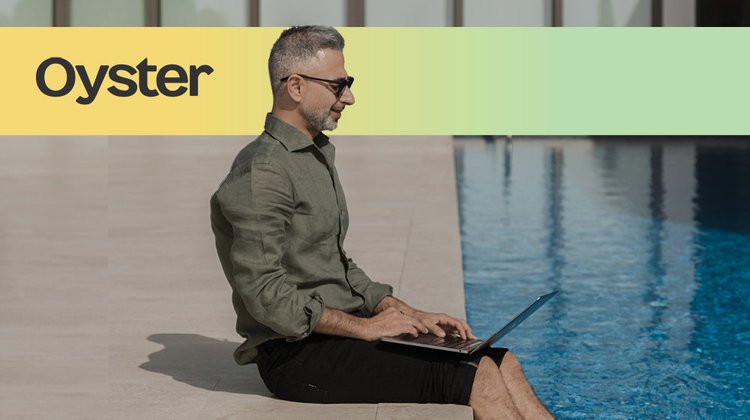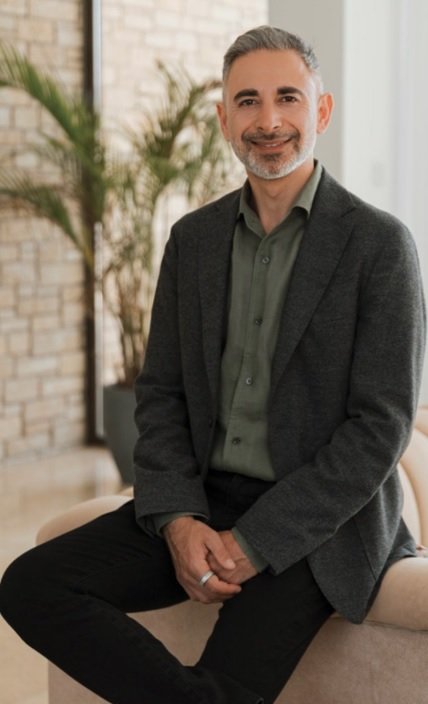Tony Jamous on how emerging economies can benefit from the remote work model
Adonis Adoni 07:22 - 15 May 2024

In 2020, Tony Jamous founded the global employment platform Oyster, which quickly evolved into the benchmark for remote work.
Here, he explains the reasons behind the company’s meteoric rise, what makes the remote work model tick and how emerging economies can benefit from it.
“When we started Oyster, we’d done our research and knew that remote work would become the main model within 10 years. We didn’t anticipate, though, that it would happen at a much faster pace,” says Tony Jamous. Since founding the global employment platform that unchains employers from the restraints of finding, hiring, paying and caring for remote workers, Jamous has taken up residence in the hillside village of Peyia in the Paphos district. It is from this idyllic, slow-paced place that he has steered Oyster’s breakneck pace of growth – it outpaced Google in its respective first year – and he now oversees a fully-remote, 500-strong team spread across 70 countries. Building a distributed company was partly driven, he reveals, by his desire to move to Cyprus, which in turn was manifested by both his connection to his Levantine heritage (Jamous was born and raised in Lebanon) and a deep yearning to change his life.
Behind Jamous, who is talking to GOLD via Zoom from what appears to be his home workspace, stands a guitar with a deep green pearl finish plugged into an amplifier. Jamous explains that playing it is a hobby that he has adopted over the past year, made possible by nixing commuting and other office-related time-consuming activities. “Now that I live in Cyprus and my village,” Jamous says, “I can connect with my neighbours and have a coffee with my friends. I’ve started rebuilding my local social life, which was stolen from me when I was going to the office.” Indeed, reclaiming the time lost during daily commutes is frequently cited as the primary motivation for workers seeking remote flexibility from their employers, closely followed by concerns regarding location, as the cost-of-living crisis has made it challenging to rent or purchase real estate in densely populated and prohibitively expensive city centers, where most companies are situated.
He also draws attention to how the remote work model can become an avenue for wealth – the average salary on Oyster is US$75,000 – and growth for employees in emerging markets. “Let’s say you’re an amazing engineer from a top university in Lebanon and then you go to work for a local bank. Five years after starting your career, you’re going to plateau,” he notes. By the same token, emerging economies can benefit since highly skilled employees will be less inclined to migrate for a better life. “That talent is not coming back home. So, if people can stay in their communities while having access to these great job opportunities, we can really have a shot at stopping the brain drain,” he says.
The remote work model, both fully and hybrid, is best defined as knowledge work, essentially the evolution of white-collar work, as both deal with the management and application of knowledge. But whereas its predecessor thrived within the confines of a corporate office, today’s knowledge worker staunchly believes that the office is wherever the laptop is. This perception was supercharged by the stay-at-home mandates to curtail the spread of the coronavirus pandemic – in 2021, two out of ten Europeans worked from home. Naturally, the pandemic acted as a launchpad for Oyster, which by 2022, it raised more than US$220 million, including a US$150 million Series C round at a US$1-billion-plus valuation, backed by bigwigs like LinkedIn, Slack Fund, PayPal Ventures and Salesforce Ventures, which bet that remote work had come to stay. They were right on the money, so far. Since 2023, quite a few companies have rolled out policies and tactics to bring their employees back into the office but even these have not called for a complete return: Disney now has a four-day workweek, while Google has asked workers to be in the office three days a week but has said that lengthy, unexplained absences will count in performance reviews. Salesforce, meanwhile, continues to support the model but has offered to make a US$10 charitable donation per day on behalf of any employee who comes into the office.
Back in our Zoom call, Jamous stresses that some of these return-to-office mandates should be viewed with the following caveat: public companies that have invested heavily in infrastructure would rather not provoke Wall Street’s ire by writing them off as a loss. Nonetheless, the remote work model is not without its problems and Tony Jamous would be the first to attest to that.
In 2018, he exited his previous venture – Nexmo – then the second largest Communications Platform-as-a-Service by revenues globally, persuading American cloud communications provider Vonage to sign a hefty US$230 million cheque. Throughout the seven-year journey of growing Nexmo, Jamous had practically lived on a plane, touching down in over 40 countries where the company had offices. Inevitably, such ceaseless globetrotting exacted a toll, not only on his relationships with others but, perhaps more significantly, on himself; one can also imagine that the dubious fare of airport cuisine did little for his physical wellbeing. “It was not the life that I wanted,” he reflects. “I wanted to be productive and effective no matter where I lived, and to be there for my loved ones and myself.” Meanwhile, managing Nexmo’s distributed force proved hazardous, from navigating a quagmire of administrative and legal woes – it had to set up legal entities everywhere it established a base – to pouring millions into an internal employment infrastructure that ultimately failed to deliver both scalability and a great employee experience. During the pandemic’s great transition to remote working, researchers ventured to study its impact and observed a drop in productivity, particularly concerning the fully remote model. Communication bottlenecks exasperated the issue – navigating an online meeting can become tediously challenging – and it appeared that employees were retreating into their shells, talking to fewer people daily both inside and outside their company. Notwithstanding the difficulty of defining ‘productivity’, since not all jobs and tasks suit the model, Jamous argues that the issue can be explained by a simple fact: companies were not set up for remote work so adopting it is not as simple as changing a couple of internal procedures.
“If you design the company so that you can work from anywhere,” he says, “remote work is so much more productive.”

For companies looking to adopt the model, Oyster’s platform removes most – if not all – legal and administrative headaches associated with overseeing distributed teams: it generates compliant employment contracts, it has a benefits advisor module that makes suggestions to employers on the best package to retain employees specific to their region, and acts as the legal employer, processing payroll, expenses, health insurance claims and the like. Today, 80% of all employment requests received from 180 countries are fully automated. In 2024, the company will release a new tool, which Jamous describes as “a vertical knowledge management system” for all the compliance rules and HR data across all 180 countries. “And we’re augmenting that unique vertical knowledge with AI capabilities, so we can help our customers around the world access global employment at their fingertips,” he adds.
So, how did he design the Oyster platform to enable his own employees to work remotely?
“When I started this business,” Jamous replies, “I hired an executive headhunting firm to cherry-pick the best people to come and build this with me; I really focused on building the best fit-for-purpose team.”
On top of a strong C-level spine, the Oyster Operating System was designed to provide a set of internal processes and best practices to boost productivity, irrespective of location, and to ensure that employees stay connected within the company. Nonetheless, Oyster employees (Jamous refers to them as “pearls”) are trained on how to use digital tools that can make them more efficient. For meetings, there is meticulous preparation with a 48-hour window of notification, and Jamous mentions that they also track participants’ engagement to ensure that they are all on the same page. Interestingly, on Fridays, meetings are eschewed entirely. “It’s really about creating an opportunity to disconnect from work, so you come back next week, fully recharged, motivated and committed,” Jamous explains. The company has also designed a course called Oyster Academy that provides training on how to improve while working remotely, which is also available free online for companies interested in implementing the model. Furthermore, recognising that working from home can generate feelings of isolation, leading to depression and other mental health disorders, the company provides mental health support, both via therapists and a mental health channel where people can come together – anonymous or otherwise. Still, working in different time zones can sometimes present a challenge, especially during a crisis, but Jamous notes that they strive to limit such instances as much as possible.
As a business leader, Tony Jamous has also had to adapt. He says, “You have to be intentional in how you live your life as a leader, modelling the way for the rest of the organisation.” Trust and psychological safety lie at the heart of these values, conditions which some consider necessary to foster creativity and boost productivity. The way he embodies these values is by defaulting to assuming best intentions when mistakes are made and remaining calm in a crisis. “It’s also about encouraging people to make small mistakes and learn from them. If I really want to be a leader, I have to trust my team. Of course, I will come and help when it’s required but I won’t supervise them because I feel I cannot trust them – that module in my brain has been deleted!”
“On a more personal level,” I ask, “how did growing up in war-torn Lebanon influence your ideas?”
Fingers grazing his stubble, he gazes downward in serious contemplation. After a moment, he says, “My whole life has prepared me for this. When you grow up in a war zone, you develop PTSD (Post-Traumatic Stress Disorder), which is essentially a heightened fear response. You see risks everywhere and that plays games with your mental health. So, that’s why it’s been important to me.”
For Jamous, a work environment should not create more anxiety than life has already provided. He wants people to be able to see a doctor at any time, pick up their children from school, or even get a massage in the middle of the day. In his worldview, the remote work model is more than just a change to internal procedures; rather, it represents a fundamental shift in the occupational composition of society. In his own words, “I want people to understand that we are creating work that supports their lives.”
(Photos by Giorgos Charal)
This interview first appeared in the April edition of GOLD magazine. Click here to view it.

